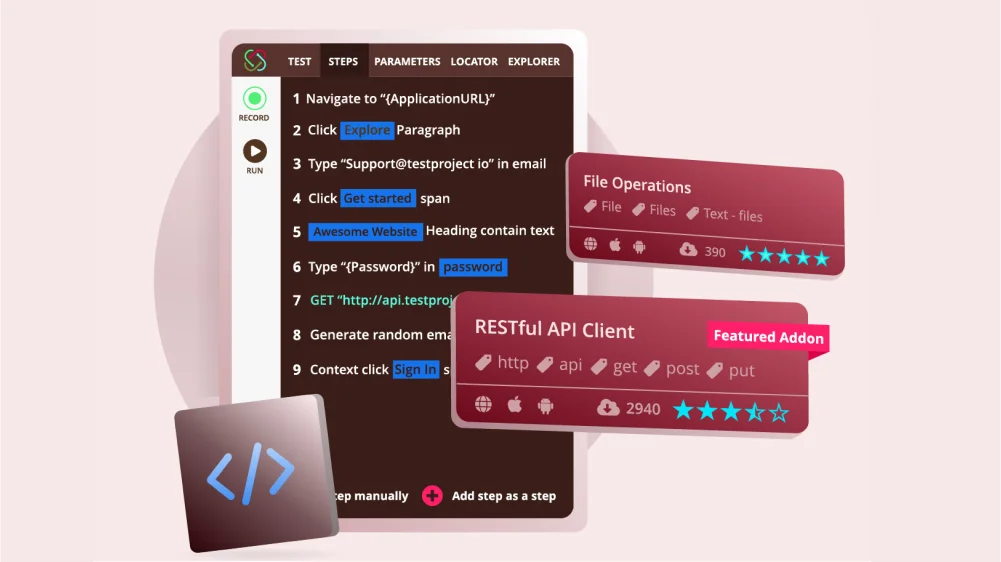
Can Anyone Become a Programming Expert with Low-Code Automation Tools?

Content Map
More chaptersWhile coding classes conjure visions of all-nighters debugging code, the future of programming is much brighter. As low-code tools level up workflows, even rookies are now rapidly rising to rockstar status in mere months!
Gone are the days when only seasoned wizards wielded such capabilities. Now, industry insiders reveal how newbies from any field are teaching themselves to automate, innovate, and develop full-stack solutions through visual tools.
Low-code automation tools are revolutionizing the way we approach programming. By 2024, low-code platforms are expected to account for more than 65% of all application development activity. This surge is driven by their ability to empower both skilled developers and non-developers to create complex applications quickly and efficiently. In fact, the global low-code development market is expected to reach a staggering $187 billion by 2030. With such impressive growth and potential, the question arises: Can anyone truly become a programming expert with the help of a low-code automation or even no-code automation tool? Let’s dive in and explore this transformative trend.
Key Takeaways:
- Low-code automation tools like Katalon Studio, Tricentis Tosca, and Testim are revolutionizing the software testing landscape. They offer speed, efficiency, and accessibility, enabling even non-programmers to automate complex testing processes.
- While low-code development platforms offer numerous advantages, such as rapid application development, accessibility for non-programmers, and enhanced collaboration, they also have limitations. These include constraints on customization, complexity in handling advanced functionalities, and scalability issues for larger, more complex projects.
- Becoming a programming expert requires more than low-code tools. While low-code platforms can be valuable assets, a solid foundation in computer science and coding is essential for mastering software development.
What Are Low-Code Automation Tools?

Low-code development platforms are software that offer an environment programmers use to build application software through configuration and graphical user interfaces instead of traditional computer programming. The goal is to minimize hand-coding and enable rapid deployment of business applications, ultimately to expedite the process of creating full-featured applications.
Low-code test automation tools, on the other hand, are a subset of these platforms that focus on improving the testing process. These tools are developed to simplify the creation and execution of automated tests, reducing the time and expertise required to carry out comprehensive and effective testing processes.
A low-code automation testing tool allows developers and testers to build test scenarios using a visual interface, which can then be translated into code in the background. This approach makes it easier to achieve thorough test coverage without requiring extensive coding knowledge. It’s a way to democratize the automated testing process, making it accessible to non-technical team members and ensuring that high-quality, reliable software can be delivered more quickly and efficiently.
Test automation is an important component of modern software development and is particularly valuable in Agile and DevOps methodologies. Automation testing tools can execute tests, report test data outcomes, and compare results with earlier test runs. These tools allow you to run tests at any time of day frequently.
The use of low-code testing tools extends beyond functional testing. They can also be used for performance testing, load testing, and even security testing. In essence, they are a way to ensure that software testing is as thorough, efficient, and effective as possible. By automating these processes, teams can focus more on designing effective tests and less on the mechanics of running them. This ultimately leads to higher-quality software and faster delivery times.
Top Low Code Automation Tools

The rise of low-code platforms has revolutionized the way software development and testing are conducted, enabling both technical and non-technical users to build, automate, and optimize applications with greater speed and flexibility.
Katalon Studio
Katalon Studio is a comprehensive low-code automation solution that caters to various application types, including web, mobile, and desktop applications. Its intuitive, codeless interface allows users to design, record, and playback test scenarios through a user-friendly point-and-click interface, making it accessible to a diverse user base. Katalon Studio’s robust capabilities extend beyond just test automation, as it offers features for API testing, cross-browser testing, and seamless integration with a wide range of third-party tools, such as Jira, Jenkins, and Slack. This versatility makes Katalon Studio a popular choice for teams working in complex, multi-tool environments.
Tricentis Tosca
Tricentis Tosca, on the other hand, is an enterprise-level low-code automation platform that specializes in continuous testing. Its model-based test automation approach enables users to create reusable test assets and automate complex scenarios with minimal coding. Tricentis Tosca’s advanced capabilities, such as risk-based testing and impact analysis, make it a valuable asset for organizations with large, complex applications and DevOps-driven software development practices. The platform’s ability to integrate with various tools and applications throughout the software development lifecycle, including CI/CD tools, test management systems, and requirements management platforms, further enhances its appeal to enterprises seeking a comprehensive testing solution.
Testim
Testim, a third prominent low-code automation tool, focuses on efficient test creation and maintenance. Its machine learning-powered self-healing capabilities ensure that tests remain resilient to changes in the application under test, reducing the time and effort required for test maintenance. Testim’s intuitive visual editor and collaboration features make it an attractive option for Agile development teams looking to streamline their testing processes and maintain a high level of test coverage without the need for extensive coding expertise. Additionally, Testim’s advanced analytics and reporting capabilities provide meaningful insights into the effectiveness and performance of automated test scripts, enabling teams to optimize their testing strategies.
Parasoft SOAtest
Parasoft SOAtest specializes in API and web service testing. It offers a user-friendly interface that allows developers, testers, and even non-technical users to create and execute automated tests with ease. Leveraging a visual, drag-and-drop interface, Parasoft SOAtest enables users to design complex test scenarios without the need for extensive programming knowledge. The tool’s advanced capabilities include support for a wide range of protocols, data-driven testing, and seamless integration with popular development and testing frameworks. Parasoft SOAtest’s strength lies in its ability to validate the functionality, security, and performance of APIs and web services, ensuring the reliability and quality of enterprise-level applications.
Ranorex
Ranorex, on the other hand, is a comprehensive low-code automation tool that caters to a broader range of use cases, including web, desktop, and mobile application testing. Its intuitive user interface and codeless test creation capabilities empower users, from beginner to expert, to automate their testing processes efficiently. Ranorex offers a rich set of features, such as cross-browser and cross-device testing, image-based object recognition, and data-driven testing. Additionally, the tool’s integration with popular testing frameworks and CI/CD pipelines makes it a versatile option for users looking to streamline their software development and quality assurance workflows.
Can Newbies Become Coding Experts with Low-Code Tools?

The rise of low-code development platforms has undoubtedly democratized the world of software creation, making it more accessible to a broader audience. However, the question of whether anyone can become a programming expert solely through the use of low-code automation tools is more nuanced.
One of the primary advantages of low-code platforms is their ability to empower non-technical users, such as business analysts and domain experts, to participate actively in the application development process. The visual and intuitive nature of these tools allows individuals with limited coding experience to create and customize applications, fostering greater collaboration and innovation within organizations. By providing pre-built components, visual drag-and-drop interfaces, and automated code generation, low-code platforms significantly accelerate the development process, enabling even novice users to build functional applications in a relatively short amount of time.
Furthermore, the collaborative and integration capabilities of low-code platforms encourage cross-functional teamwork, where individuals with diverse backgrounds can contribute their domain expertise and work alongside technical resources to deliver effective solutions. This synergy can help non-programmers develop a deeper understanding of application development principles and best practices, gradually building their programming skills.
However, it’s important to recognize that while low-code tools can empower non-technical users to create applications, becoming a true programming expert requires a more comprehensive understanding of software development fundamentals. Low-code platforms, by design, aim to abstract away the complexities of traditional coding, which can limit the depth of knowledge gained by users who solely rely on these tools.
As applications become more sophisticated, the limitations of low-code platforms may become more apparent. Implementing advanced features, such as complex algorithms, integrations with legacy systems, or specialized data processing, may require a more traditional coding approach that falls outside the capabilities of the low-code environment. Consequently, users who aspire to become programming experts may need to supplement their low-code experience with a deeper understanding of programming concepts, algorithms, and system architecture.
Additionally, the scalability of low-code solutions may become a concern when dealing with large-scale, enterprise-level projects with extensive data volumes, complex business logic, and high-performance requirements. In such cases, a more robust, code-based approach may be necessary, requiring a higher level of programming expertise.
Final Thought
In conclusion, while low-code automation tools can undoubtedly empower non-technical users and accelerate the application development process, becoming a true programming expert requires a more comprehensive understanding of software development principles and practices. Low-code platforms can serve as a bridge, allowing individuals to start building applications and gradually develop their programming skills. However, for those who aspire to become programming experts, a balanced approach that combines low-code experience with traditional coding knowledge is likely to be the most effective path forward.
If you’re looking to leverage the benefits of low-code development while also building robust, scalable applications, consider partnering with an experienced software development company like Orient Software. With a team of seasoned programmers and a deep understanding of both low-code and traditional coding methodologies, Orient Software can help you strike the right balance and guide you on your journey to becoming a programming expert.
Whether you need assistance with implementing advanced features, ensuring scalability for complex projects, or bridging the gap between low-code and traditional development, Orient Software’s experts are ready to consult and support your software initiatives. Contact us today to learn how we can help you unlock the full potential of low-code automation tools while also cultivating your programming expertise.






